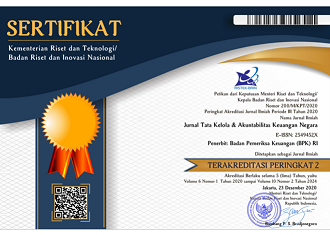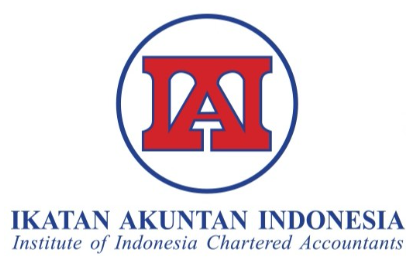UNQUALIFIED OPINION AND LEVEL OF CORRUPTION: THE TRIANGULATION APPROACH
DOI:
https://doi.org/10.28986/jtaken.v4i2.170Keywords:
Audit opinion, corruption level, triangulation approachAbstract
Corruption cases that occur in almost all provinces throughout Indonesia potentially bring financial harm to the government, drawing public attention in the last few years. A large number of provinces where such cases occur have received Unqualified Opinion. As a result there is a discrepancy between the public's perception and the findings of the BPK, Indonesia's supreme audit institution. The public is assured that government institutions or agencies that have received unqualified opinion are free from potential corruption. On the other hand, there are still potential corruption found that can cause financial harm to the state. Meanwhile, the government (BPK) has not conducted any audit on the financial reports to detect corruption. This inconsistency between public perception and the perception of the government, in this case the BPK, is referred to as an expectation gap. This study aims to prove that an unqualified opinion does not relate to level of corruption. The research method uses a combination of qualitative and quantitative/triangulation approach (mixed method). The study collects samples from 31 provinces throughout Indonesia. The result of this study indicates that an unqualified opinion represents the good governance of an organization. However, such opinion does not necessarily guarantee that the institution is free from potential corruption. The reason is that a BPK audit is not designed to detect corruption, but rather to determine the fairness of information presented in financial reports. Result of quantitative testing conducted during the study also confirms the result of the qualitative testing, and thus it can be affirmed that an unqualified opinion does not significantly relate to corruption level.
References
BPK RI. (2013). Panduan Pemeriksaan Laporan Keuangan Daerah. Jakarta: BPK.
BPK RI. (2017a). Peraturan Badan Pemeriksa Keuangan Republik Indonesia Nomor 1 Tahun 2017 tentang Standar Pemeriksaan Keuangan Negara. Jakarta: BPK.
BPK RI. (2017b). Ikhtisar Hasil Pemeriksaan Semester I tahun 2017. Jakarta: BPK.
BPK RI. (2018). Ikhtisar Hasil Pemeriksaan Semester I tahun 2018. Jakarta: BPK.
BPS. (2017). Produk Domestik Regional Bruto Provinsi-Provinsi di Indonesia Menurut Pengeluaran 2012-2016. Jakarta: BPS.
Bourn, S. J. (2007). Public sector auditing: is it value for money?. West Sussex: John Wiley and Sons Ltd.
Cooper, D. R., & Schindler, P. S. (2014). Business research methods. New York: McGraw-Hill.
Government Regulation Number 24 Year 2005 about Government Accounting Standard (Peraturan Pemerintah Nomor 24 Tahun 2005 tentang Standar Akuntansi Pemerintahan). Retrieved from http:// peraturan.go.id/pp/nomor-24-tahun -2005- 11e44c4ed5866a00ab6931323137303 0.html.
Government Regulation Number 71 Year 2010 about Government Accounting Standard (Peraturan Pemerintah Nomor 71 Tahun 2010 tentang Standar Akuntansi Pemerintahan). Retrieved from http:// peraturan.go.id/pp/nomor-71-tahun2010- 11e44c4f4fce3ab09f7d313232303235. html.
Gujarati, D., & Porter, D. C. (2009). Basic econometrics (5th Edition). New York: McGraw-Hill.
Gunarwanto. (2017). Kata Pengantar. Jurnal Tata Kelola dan Akuntabilitas Keuangan Negara, 3(2), iii.
Hartono, J. (2014). Metode penelitian bisnis (Edisi 6). Yogyakarta: Universitas Gadjah Mada.
Heriningsih., & Merita. (2013). Pengaruh opini audit dan kinerja keuangan pemerintah daerah terhadap tingkat korupsi pemerintah daerah (studi empiris pada pemerintah kabupaten dan kota di pulau Jawa). Buletin Ekonomi, 11(1), 1-12.
Indonesia Corruption Watch. (2016). Kinerja penindakan perkara korupsi. Jakarta: ICW.
Indonesia Corruption Watch. (2017). Kinerja penindakan perkara korupsi. Jakarta: ICW.
Ismunawan. (2016). Pengaruh faktor non keuangan dan keuangan terhadap tingkat korupsi pemerintah daerah di Indonesia. (Tesis). Universitas Sebelas Maret, Solo.
Jensen, M. C., & Meckling, W. H. (1976). Theory of the firm: managerial behavior, agency cost and ownership structure. Journal of Financial Economics, 3(4), 305-360. doi: 10.1016/0304-405X(76)90026-X.
Kejaksaan Republik Indonesia. (2017). Laporan Tahunan Kejaksaan Republik Indonesia 2016. Jakarta: Kejaksaan RI.
Law of The Republic of Indonesia Number 17 Year 2003 about State Finance (Undang-Undang Nomor 17 Tahun 2003 tentang Keuangan Negara). Retrieved from https:// www.kemenkeu.go.id/sites/default/ files/pdf-peraturan/law%20no% 2017%20of%202003.pdf.
Law of The Republic of Indonesia Number 15 Year 2004 about The State Financial Management and Accountability Audit (Undang-
Undang Nomor 15 Tahun 2004 tentang Pemeriksaan Pengelolaan dan Tanggung Jawab Keuangan Negara). Retrieved from https://www.kemenkeu.go.id/sites/ default/files/pdf-peraturan/uu% 20nomot%2015%20tahun% 202004.pdf.
Law of The Republic of Indonesia Number 32 Year 2004 about Local Government (Undang-Undang Nomor 32 Tahun 2004 tentang Pemerintah Daerah). Retrieved from http://www.dpr.go.id/dokjdih/ document/uu/33.pdf.
Law of The Republic of Indonesia Number 15 Year 2006 about The Audit Board (Undang-Undang Nomor 15 Tahun 2016 tentang Badan Pemeriksa Keuangan). Retrieved from https:// jdih.kemenkeu.go.id/ fulltext/2006/15tahun2006uu.htm.
Liu, J., & Lin, B. (2012). Government auditing and corruption control: evidence from China’s provincial panel data. China Journal of Accounting Research, 5(2), 163-186. doi: 10.1016/j.cjar.2012.01.002.
Masyitoh, R. D., Wardhani, R., & Setyaningrum, D. (2015). Pengaruh opini audit, temuan audit, dan tindak lanjut hasil audit terhadap persepsi korupsi pada pemerintah daerah tingkat II tahun 2008-2010. Simposium Nasional Akuntansi XVIII Medan.
Rini, R., & Damiati, L. (2017). Analisis hasil audit pemerintahan dan tingkat korupsi pemerintah provinsi di Indonesia. Jurnal Dinamika Akuntansi dan Bisnis, 4(1), 73-90.
Rini., & Sarah, A. (2014). Opini audit dan pengungkapan atas laporan keuangan pemerintah kabupaten serta kaitannya dengan korupsi di Indonesia. Jurnal Etikonomi, 13(1), 1- 20. doi: 10.15408/etk.v13i1.1875.
Shleifer, A., & Vishny, R. W. (1993). Corruption. Quarterly Journal of Economics, 108(3), 599-617. Retrieved from https:// projects.iq.harvard.edu/gov2126/ files/shleifer_and_vishy.pdf.
Svensson, J. (2005). Eight questions about corruption. Journal of Economic Perspectives, 19(3), 19-42.
Tehupuring, R., & Lingga, R. A. (2017). Sistem pengendalian intern sebagai prediktor kecurangan akuntansi pada pemerintah daerah. Dapatkah loyalitas individu memitigasinya?. Jurnal Tata Kelola dan Akuntabilitas Keuangan Negara, 3 (2), 113-129. doi: 10.28986/ jtaken.v3i2.111.
The 1945 Constitution of The Republic of Indonesia (Undang-Undang Dasar Negara Republik Indonesia Tahun 1945. Retrieved from http:// peraturan.go.id/inc/ view/11e58ce2b70ac2c094ce3131323 13436.html.
Transparency International. (2016). Corruption Perception Index Tahun 2016. Retrieved from https:// www.transparency.org/research/cpi/ overview.
Downloads
Submitted
Accepted
Published
How to Cite
Issue
Section
License

Jurnal Tata Kelola dan Akuntabilitas Keuangan Negara is licensed under
a Creative Commons Attribution-ShareAlike 4.0 International License




















